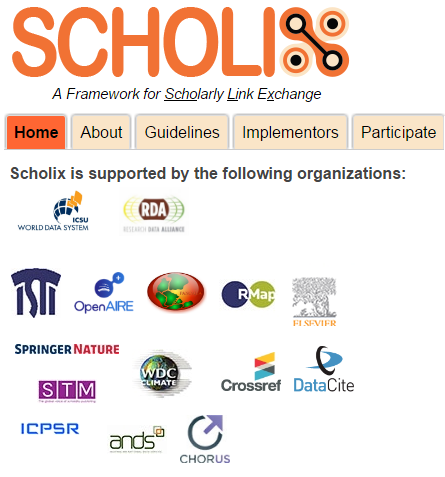SCHOLIX: A Global Framework for Publishing Data Services Linking Publications and Datasets


Through the efforts of the ICSU-WDS and RDA Data Publishing Services Working Group, and a number of key global players in research information, the Scholix global framework was developed to present vision and guidelines for exchanging information about the links between scholarly literature and data, using a common, global approach.
On 20th June 2016, the International Council for Science World Data System (ICSU-WDS) and the Research Data Alliance (RDA) Working Group on Data Publishing Services, and a number of other key global players in research information announced the launch of Scholix (Scholarly Link Exchange) framework.
The Scholix framework consists of a conceptual and information model containing standards, aspirational principles, practical guidelines and options for encoding and exchange protocols to support linking between scholarly publications and related research data. Such a framework aims to:
- increase visibility and discoverability of data and articles,
- make easier their sharing, re-use and reproducibility in different contexts,
- support credit attribution mechanisms thus enhancing transparent evaluation of science.
Data-Literature Interlinking (DLI) Service, DataCite Event Data, Crossref Event Data and Linked Clinical Trials are the first exemplar aggregations and query services fed by the Scholix open information ecosystem.
If you represent a research service with information about data-literature links, you have two options to get involved in Scholix :
OPTION 1:
Feed your data-literature link information to an existing Scholix hub using your existing community standards.
OPTION 2:
Become a Scholix hub and share your data-literature link information using the Scholix Guidelines (Interoperability Framework Recommendations). In this case your service will be registered with other Scholix hubs and aggregator service on the Scholix implementors web page.
The hubs agree on an interoperability framework with a common information model and open exchange methods, optimized for exchanging information among the hubs.
You can also help to expand and document the Scholix Guidelines:
First steps toward interoperability
From here to there: phasing and next steps
by contacting [email protected] or by joining the the RDA-WDS Working Group on Data Publishing Services.
The Working Group encourages you to follow proposed best practices and recommends further work be done in identifying appropriate standards and principles applicable for each sub-set of the interoperability framework that should underpin a global data-literature information eco-system.
Such a system emerges as a result of a high level of “few to few” interoperability between the hubs:

(Source: Scholix Guidelines)
based on common information models and negotiated exchange protocols that facilitate the generating, sharing, aggregating and exploitation of the links between research data and the literature.
Over time, Scholix approach could be extended to other types of research objects in and beyond research (e.g. software, tweets, etc).
Source: SCHOLIX
Might also be of your interest:
E-Infrastructures: Making Europe the best place for research and Innovation – (EC Booklet, June 2016)
Data Literature Interlink Service (DLI): a universal service bridging Data Centers and Publishers (AIMS blog, 2016)
Opening and Linking Agricultural Research Data (D-Lib article, 2014)

